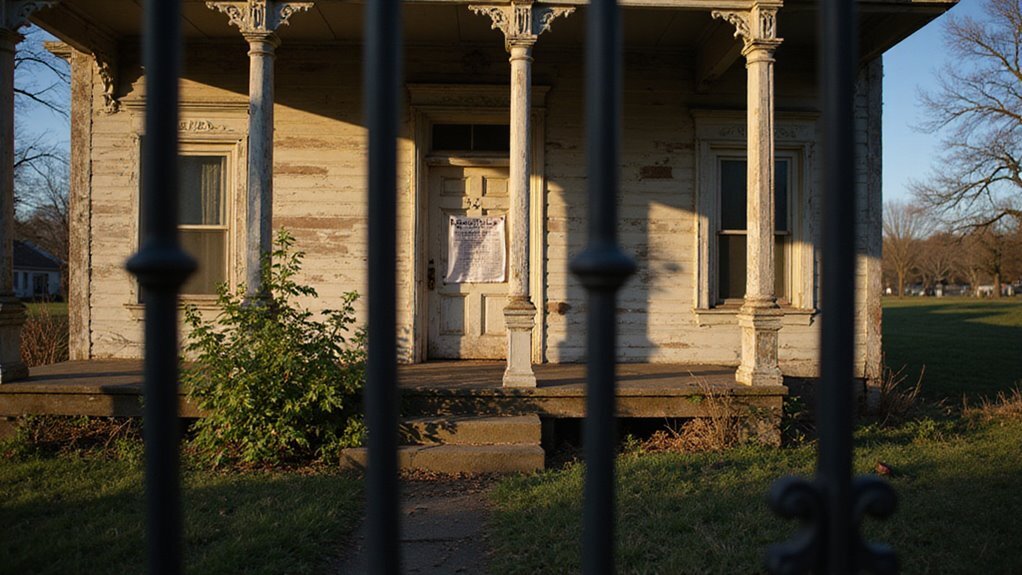Can You Really Sell a House in Probate in Kentucky?
Inheriting property sounds like a blessing until you face Kentucky’s complex probate system. Selling an inherited house means navigating court approvals, legal requirements, and lengthy waiting periods. Delays can stretch for months while you pay maintenance costs, taxes, and legal fees. Understanding probate rules helps you choose faster selling options and streamline the process.
Selling a house in probate in Kentucky requires court approval and following specific legal procedures. You must get the property appraised, submit offers to the court, and wait for approval. The process typically takes several months, but you can choose traditional listings, auctions, or cash sales.
In this guide I will explore everything related to selling a house in probate in Kentucky.
Key Takeaways
- Court approval is required before selling a probate property in Kentucky.
- The property must be appraised and sold for at least 90% of its value.
- The sale process involves a court hearing for confirmation and legal approval.
- Executors must resolve debts and liens before closing the sale.
- Fast options like cash buyers or auction services can expedite probate house sales.
What is Probate and How Does it Affect Home Sales?

Probate is the court-supervised process that transfers a deceased person’s property to heirs or beneficiaries. Courts verify the will, settle debts, and authorize asset distribution.
The executor must petition the court before selling any real estate. Kentucky law typically requires properties to sell for at least 90% of their appraised value. This protects the estate’s interests. Courts review appraisals and approve sales to ensure fairness.
The timeline varies but often takes several months. Liens and outstanding debts must be cleared first. Understanding these requirements helps you navigate the process smoothly and honor the deceased’s wishes.

“Brian with Ky Sell Now couldn’t have been any better to deal with. The offer was reasonable, they did what they said they would do, and did it when they said they would do it. Terms were good and they were flexible meeting our terms and needs.“
David Weinberg
Why Might You Need to Sell a Probate Property?
You may need to sell a probate property to pay off estate debts, taxes, or liens. The sale generates funds to cover these obligations quickly. As executor, you must sell for at least 90% of the appraised value and get court approval.
The property might require costly repairs that heirs can’t afford. Sometimes heirs prefer cash over property ownership. A quick sale simplifies estate settlement and fulfills your legal duties. This approach helps distribute assets fairly among beneficiaries.
What Are the Different Types of Probate Processes?

Kentucky offers several probate options, depending on your estate’s size and complexity. You might go through Formal Administration for full court oversight, or opt for Summary Administration if the estate is small and straightforward.
For simpler cases, Small Estate Procedures can speed things up, while Independent Administration is available if the will permits it.
Formal Probate Administration
Formal probate administration requires full court supervision throughout the estate settlement process. The court monitors every major decision to protect all parties involved. This legal process typically takes several months to over a year to complete.
You must file a petition with the probate court to begin. The court then reviews your authority as executor and verifies the estate’s assets. Additionally, the judge must approve all significant transactions and distributions.
This approach works best for complex estates or when disputes arise. The court ensures debts are paid and property transfers follow Kentucky law. Your responsibility includes coordinating with court officials and maintaining transparent records for heirs and creditors.
Summary Administration
Summary administration is a simplified probate process for smaller estates in Kentucky. It allows faster settlement with less court involvement. This option works when estate values fall below specific thresholds.
The process requires fewer steps than traditional probate. Heirs receive property more quickly. In addition, court oversight is minimal, which reduces delays. As a result, families experience less stress during an already difficult time. This method works best when debts are straightforward and assets are simple.
Independent Administration
Independent administration lets executors manage estates without constant court oversight. The will must explicitly grant this authority. This approach speeds up the entire probate process significantly.
You can sell property, pay debts, and distribute assets more freely. Court appearances become rare, which cuts both time and costs. Beneficiaries receive their inheritances faster.
However, you must still follow Kentucky probate laws precisely. This option works best when you need efficient estate settlement while maintaining proper legal compliance.
Small Estate Procedures
Kentucky allows small estate procedures when an estate meets certain value thresholds. This process skips full probate and speeds up settlement. You must file a simple affidavit or petition with the court. The process requires minimal court oversight.
Approval typically comes faster than traditional probate. This works best for straightforward cases with few complications. The procedure helps settle debts and taxes efficiently. Heirs and beneficiaries receive their inheritance without lengthy delays. Property transfers become simpler under this streamlined approach.
How to Sell a House in Probate?
To sell a house in probate, you need court approval first, unless the will grants you independent authority. You’ll also have to get an accurate property valuation, market the home effectively, and review offers carefully.
Once an offer is accepted, the court must confirm the sale before you can transfer ownership.
Getting Court Approval
Court approval protects all parties involved in a probate property sale. The court reviews the sale price, appraisal value, and any objections from heirs or creditors. This legal step ensures fairness and prevents disputes.
A probate attorney files the required petition on your behalf. The court verifies compliance with Kentucky probate law before authorizing the transaction. Once approved, you can proceed confidently knowing debts will be paid and the title will transfer properly.
Proper Property Valuation
Proper valuation protects the estate and satisfies court requirements. The court needs an accurate appraisal to confirm fair asset representation. Kentucky probate law typically requires offers at least 90% of the appraised value. A professional appraiser determines true market value.
This process benefits all heirs equally. Accurate valuation prevents underpricing and maximizes estate proceeds. Furthermore, it ensures legal compliance and speeds court approval. Transparent valuation builds trust throughout the probate process.
Marketing the Probate Property
Probate properties need strategic marketing to attract qualified buyers quickly. Honest communication about the property’s legal status builds buyer confidence.
Professional photos and detailed listings help showcase the home’s best features. Target serious investors and cash buyers through online platforms and local real estate networks.
Probate sales must meet court-approved timelines, so prompt marketing is essential. Clear property descriptions prevent confusion and speed up the sale process.
Strong marketing strategies help executors secure fair offers while satisfying legal requirements efficiently.
Accepting and Reviewing Offers
You must submit all offers to the probate court for approval. The court reviews each one to protect the estate’s interests.
Every offer must meet at least 90% of the property’s appraised value. Compare each proposal against this minimum threshold. The court will reject anything below this amount.
Act quickly to review offers as they arrive. Beneficiaries depend on your prompt action. Court confirmation is required before finalizing any sale. This process ensures legal compliance and protects all parties involved.
Completing Court Confirmation
You must schedule a court confirmation hearing after accepting an offer that meets the 90% minimum threshold. The judge will review your sale for legal compliance. This step protects both the estate and all heirs involved.
Bring the property appraisal, sale documents, and any objections to the hearing. The court ensures fair pricing before approving the transaction. After approval, you can transfer the title to your buyer and complete the sale.
Closing the Probate Sale
The probate sale closes after court approval at the confirmation hearing. The estate settles all debts, taxes, and liens first. This ensures a clean property transfer to the buyer.
Once payments clear, the court authorizes the deed transfer. The property deed must be recorded with the county. This official step transfers ownership from the estate to the new owner.
Prompt closing protects both heirs and creditors while honoring the decedent’s wishes.

“Brian was so easy to work with. They were quick and efficient. After several months of working with another buyer without closing the deal, we are thankful to have found him. We were able to get a deal done and finalized in just a matter of weeks! I would recommend Kentucky Sell Now to anyone.”
What Legal Challenges Might You Face?

Legal Challenges in Kentucky Probate Sales Kentucky probate sales involve several legal requirements you must follow.
The court must approve most sales unless you have independent executor authority. The property must sell for at least 90% of its appraised value.
Additionally, you need to resolve all estate debts and liens before closing. Heirs may contest the sale or dispute property appraisals.
Court oversight adds time to the process. These challenges require careful planning to avoid delays and ensure compliance with probate law.
How Long Does Selling a Probate House Take?
The probate house sale in Kentucky typically takes six months to over a year. The timeline depends on court procedures and estate complexity.
Straightforward estates move through the process faster. Complex cases with disputes or creditor claims take longer.
The court must review appraisals and approve the sale before closing. Additionally, you must settle all estate expenses first. This includes taxes and liens that need resolution.
Planning ahead helps you manage expectations effectively. Understanding these timelines ensures smooth transactions for all parties involved.
What Are Your Options When Selling a Probate Property?
You have several options for selling a probate property in Kentucky, including traditional real estate listings, auctions, direct sales to cash buyers, or selling directly to family members.
Each route has its own rules and timing, so you’ll need to choose the best fit for your situation. Knowing your choices helps you move through the process more confidently and efficiently.
Traditional Real Estate Listing
A traditional real estate listing lets you sell probate property through a licensed agent who markets the home publicly. The agent lists the property on multiple platforms to attract qualified buyers. Most probate sales in Kentucky require court approval before closing.
Your agent handles three key tasks. They manage all marketing and showings to potential buyers. They ensure compliance with state probate requirements. They also coordinate with the court throughout the transaction. This method protects beneficiaries while maximizing property value through competitive market exposure.
Auction Sales
Auction sales provide a fast and transparent method to sell probate property in Kentucky. Estate administrators can use auctions to transfer property to the highest bidder at fair market value. This approach works well when time is critical or debts need quick settlement.
However, auctions must follow strict court and notice requirements. Beneficiaries should participate in the process to prevent disputes.
The clear timeline eliminates lengthy negotiations and speeds up estate resolution. Proper management ensures the sale complies with Kentucky probate laws while serving everyone’s best interests.
Direct Sale to Cash Buyers
You can sell probate property directly to cash buyers without court approval or auctions. This method speeds up the estate settlement process significantly.
Cash buyers close deals in as little as 7-14 days compared to traditional sales taking 30-60 days. The trade-off is straightforward. Buyers typically offer 10-20% below market value for the convenience.
However, you avoid appraisal fees, repairs, and lengthy court procedures. This option works best when the estate needs immediate funds to pay debts or when heirs want quick distribution.
Sale to Family Members
You can sell probate property directly to family members in Kentucky. This option keeps inherited real estate within your family while reducing costs and time.
The court must approve the transaction. Sale prices typically require at least 90% of the property’s appraised value. Additionally, all estate debts and taxes must be cleared first.
Proper legal guidance helps ensure compliance with state probate laws. Family sales simplify the inheritance process while preserving your loved ones’ connections to the property.
Need to Sell Your Probate Property Fast?
Kentucky Sell Now can help you sell probate property fast. We buy homes directly from estates without traditional listing delays.
Our team provides cash offers within 24-48 hours of contact. You avoid lengthy court approvals and expensive repairs. We handle paperwork and coordinate with estate attorneys to simplify the process.
Executors receive full support through probate requirements and debt settlements. This allows your family to close the estate quickly. Focus on what matters while we manage the sale professionally and efficiently.
What does selling a house in probate mean in Kentucky?
It means selling property owned by a deceased person, with court approval to ensure debts and heirs are handled properly.
Can an executor sell a probate house without court approval in Kentucky?
No. The executor must obtain court authorization before listing or selling a probate property in Kentucky.
How long does it take to sell a probate house in Kentucky?
Typically 6–12 months, depending on court schedules, property value, and any disputes among heirs.
Are there taxes when selling a probate house in Kentucky?
Yes, possible capital gains or inheritance taxes may apply depending on property value and estate details.
Can heirs buy the probate house in Kentucky?
Yes. Heirs can purchase the property by following court procedures and paying fair market value.
Sell Your House Fast in Louisville 💰
We buy houses in Louisville As-Is! No Hidden Fees or Real Estate Commissions. Sell Your House in Louisville And Close On The Date Of Your Choice. Simply Fill Out The Form, or call (502) 610-0070 today!

